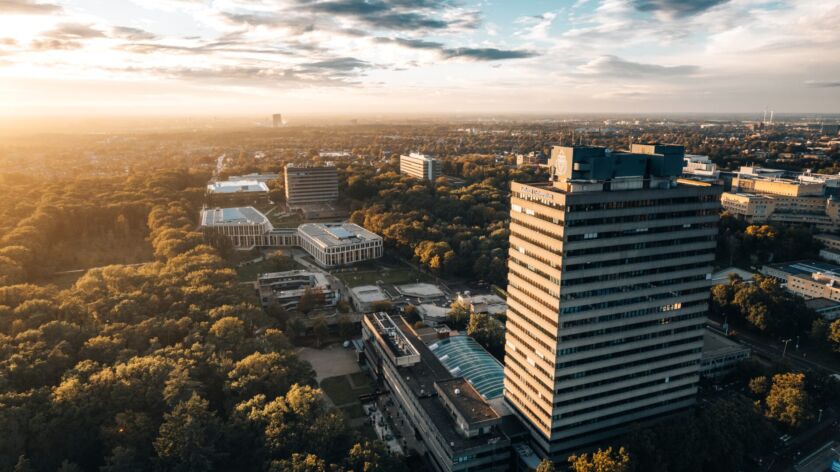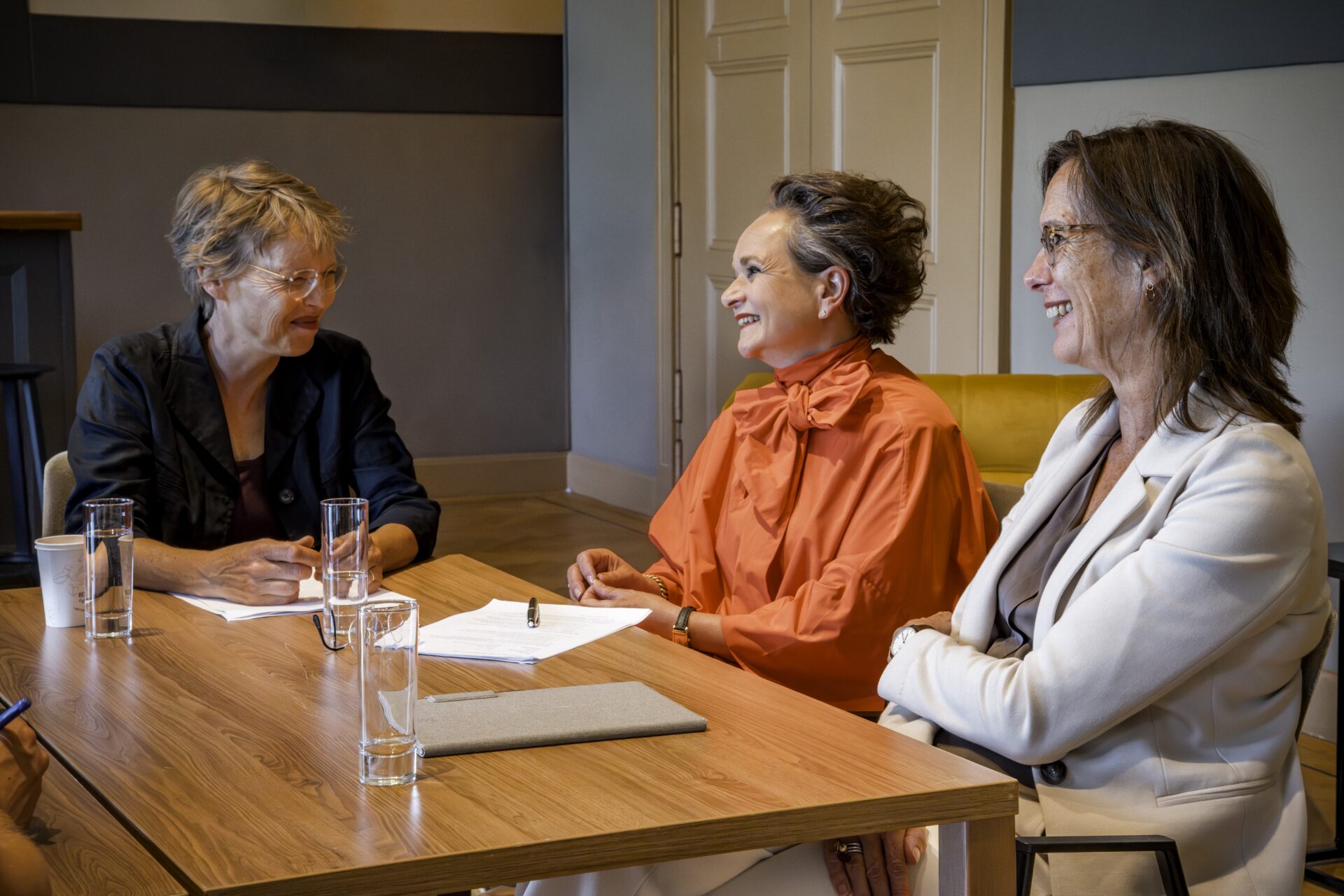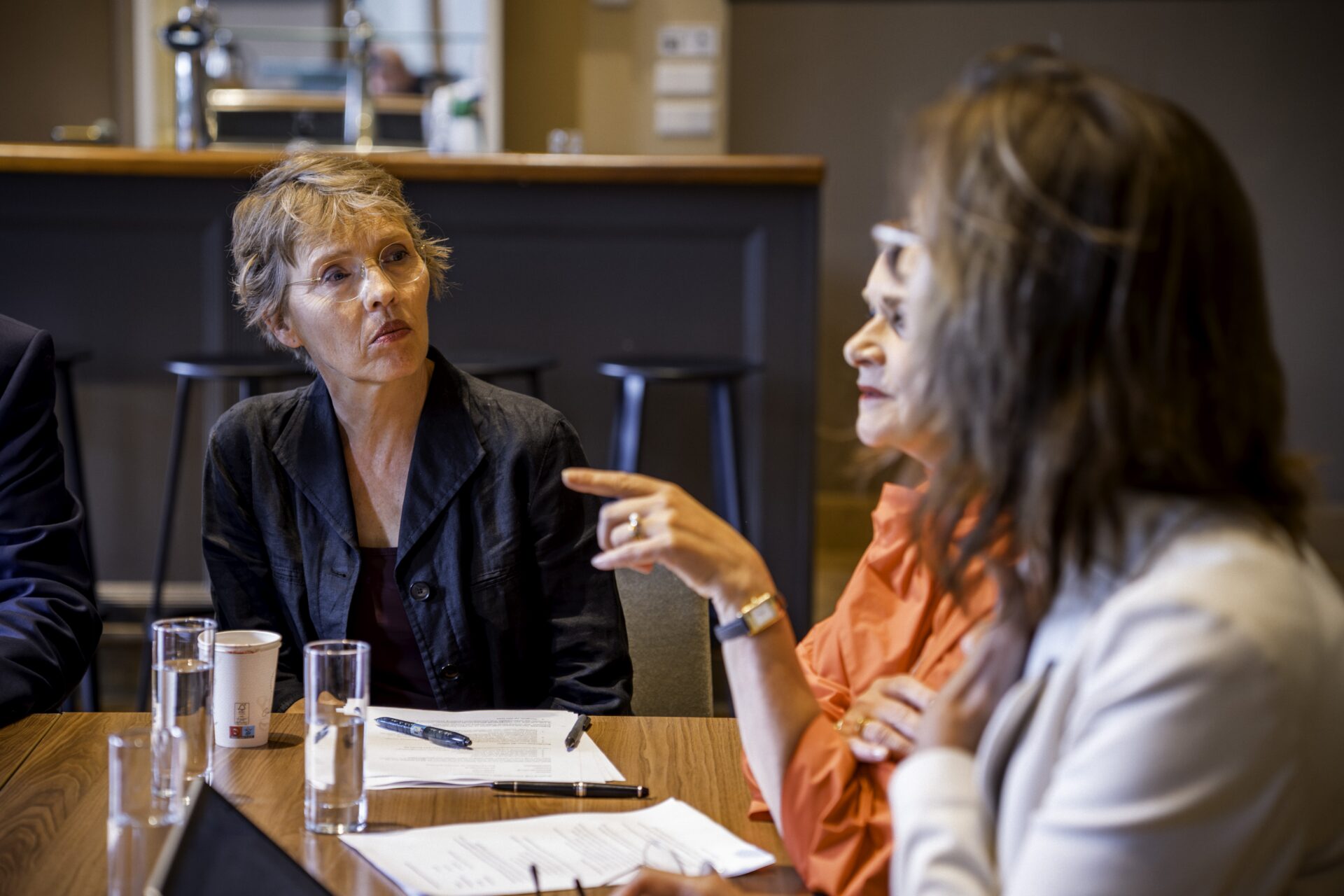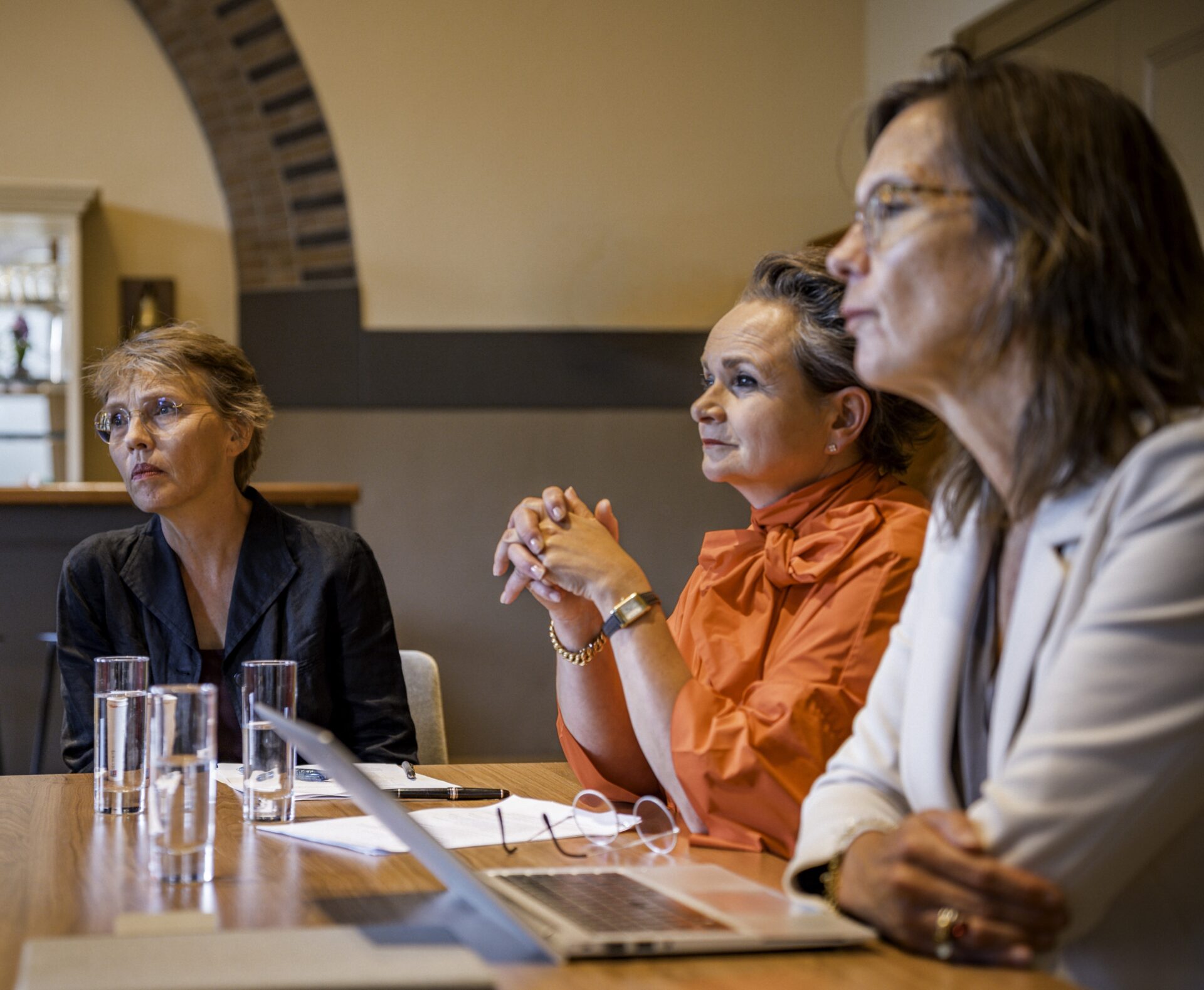Executive Board about ‘suspensful’ autumn: ‘It will soon be clear what the cuts mean for everyone’s jobs’
-
 Campus van de Radboud Universiteit. Foto: DMC
Campus van de Radboud Universiteit. Foto: DMC
Budget cuts and pro-Palestine demonstrations will doubtlessly once again dominate Vox's website in the coming months. And yet, the Radboud University administrators are also seeing signs of hope, they say at the start of the new academic year. ‘The coming weeks will be suspenseful for many people. But shaping that process in a good way also gives energy.’
Even before the new academic year had started in earnest, Radboud University had already made the national news. The reason: the arrest of a Nijmegen member of the controversial right-wing nationalist student association GNSV accused of preparing a terrorist crime.
With the multi-million dollar cuts to be implemented in the coming years and ongoing campus protests in which demonstrators demand that all ties with Israeli institutions be severed, there are plenty of challenges facing the Executive Board. Following the official opening of the academic year, Vox sat down with Rector Magnificus José Sanders, and President and Vice President of the Executive Board, Alexandra van Huffelen and Agnes Muskens, to discuss the main themes of this new academic year.
In her speech, the Rector called for the government to reverse the cuts to higher education. How realistic is that? Only a few political parties have included this in their programme for the upcoming elections.
Alexandra van Huffelen: ‘Not all party programmes are known yet. There are also parties that would like to invest 3% of the gross national product in education and science. 10 October is an important day; that is when the cost calculations of those programmes will be announced. Then we can see more clearly which political parties are actually including education plans in their finances. But there is a clear trend to start investing in research and education, which is also very much needed.’
In a previous conversation, Madam President, you indicated that you were planning to personally go to all political parties to lobby. Have you done so yet?
Van Huffelen: ‘I have talked to many political parties and asked them to reinvest in research and science. And I’ve said that we have to reverse those cuts. That remains the message from all universities.’

As party chair of D66, isn’t it hard to preach this message to other political parties?
Van Huffelen: ‘Not at all. I come there as the President of Radboud University with a message I very much believe in – and that thankfully also resonates with people.’
An agreement has almost been reached with the University Joint Assembly (UGV) about the policy letter, provided the University maintains its current funding rules for pre-Master’s programmes.
Agnes Muskens: ‘We are very happy that the “no, unless” of the participational bodies has softened to a “yes, provided”. But the total amount of the budget cuts has not changed: we have to get the numbers to fit one way or another. You should know, though, that the pre-Master’s programmes are extremely important to us, which is why we are going to explore how we can fund them in a different way than from our own budget.’
That amounts to €2 million worth of cuts that will have to be made elsewhere. Where is that money supposed to come from?
Muskens: ‘We cannot comment on that at the moment. We will be fleshing this out together with the deans and the UGV. We also have some time to do so as the planned cuts to pre-Master’s programmes would not take effect until 2027.’
What stage of the budget cuts has the University reached by now?
Van Huffelen: ‘Last spring was an important phase: that was when it became clear how much the various institutes and faculties would have to cut back. This autumn, it will become clear to people working here – in whatever position – what the cuts mean for their own jobs. That is obviously a very suspenseful period for many of us.’
‘At some faculties, there is a feeling of “we are going to make it through this”. Other faculties will have to take rigorous measures’
Muskens: ‘For some time now, our focus has been on deploying resources efficiently. Almost all faculties have a vacancy freeze, business trips have been cancelled, and many contracts have not been renewed. At some faculties, there is now a feeling of “we are going to make it through this”. Other faculties will have to take rigorous measures. We want this to happen by mutual agreement.’
Do you already know which departments or faculties will be facing reorganisations, and how many employees have to fear for their jobs?
Muskens: ‘As we said earlier, in the business operation services – Radboud Services and the support services – there will be a sharp drop in FTEs and we cannot rule out a reorganisation. Even within the primary tasks of teaching and research, we are now looking in detail with each faculty to see where they can agree on cuts. We understand that we have to do this quickly because there is unrest among the staff, but in the interest of due diligence towards all employees, this process takes time.’
Van Huffelen: ‘We are trying to solve this puzzle in a way that does as little substantive damage as possible to the University’s breadth, our teaching and research, but obviously also as little damage as possible to our people. We are not wielding some random cheese slicer here. But it is quite a complicated puzzle, one that we also have to solve together.’
According to the participational bodies, the Faculty of Philosophy, Theology and Religious Studies (FFTR) is currently disproportionately affected.
Sanders: ‘Given its areas of expertise, this Faculty, which has existed since the university was founded in 1923, is very important for the University’s breadth. At the same time, we see that Theology and Religious Studies are under pressure as a study programme. Not just here, but all over the country. We are taking this into account in the way we are solving this puzzle.’
Both the former and the new Dean of the Faculty of Philosophy, Theology and Religious Studies previously informed Vox that a merger with the Faculty of Arts was not taboo.
Van Huffelen: ‘In the context of our strategy and the budget cuts, we need to look at these kinds of themes. Both at interfaculty collaborations and at partnerships with the outside world. As far as we are concerned, there are no taboos. Above all, we need to think about what is smart and what is right. We have to start making those decisions in the time to come.’
Can this Faculty survive if it does not merge with the Faculty of Arts?
Van Huffelen: ‘I have no idea. It is too early to say anything definitive about that at present. But we want to cut as little as possible from the breadth of our University, so a merger is negotiable.’
The participational bodies want to reduce the hiring of external employees. For instance, they are critical of the number of interim employees at the Berchmanianum.
Muskens: ‘That is a fair point. We are trying to fulfil the tasks as much as possible with our own people. If that fails, and that authority lies with the management of Radboud Services, we will hire people. But this will be done carefully and based on the principle of “no, unless”.’
The vacancies for two advisers to the Executive Board came in for a lot of criticism. Do you understand why?
Van Huffelen: ‘I absolutely understand that people are critical of tasks being extended. But we also believe it is important to be well organised, especially at a time when things are getting so suspenseful for our University and when we need all the strength we can muster to carve a role for ourselves in the outside world.’
‘We also need to look at how we can attract external funding sources, such as grants from Brussels. But you only get those grants if you make a real effort to secure them. And to do that, you sometimes need extra people.’
Have the vacancies in question already been filled?
Van Huffelen: ‘Yes, starting from next month.’
Terrorism suspect
Shortly before orientation week, it turned out that the right-wing conservative student association GNSV, which also has a Nijmegen branch, was harbouring a terror suspect. This person is also a member of the nationalist youth organisation Geuzenbond, a controversial group that favours return migration, and opposes taking in asylum seekers.
The suspect was arrested on Thursday 14 August, on suspicion of planning a terrorist crime and illegal possession and self-manufacturing of weapons. Just two years ago, he was still manning the GNSV stand at the Radboud orientation market. That year, a brawl ensued at the stand between the student association and some activists, in which two GNSV members were injured.
It seems that the arrested man is not a Nijmegen student, although the institutions do not wish to comment on this for privacy reasons. However, the arrest did lead to GNSV withdrawing from the orientation market.
Will GNSV be allowed to attend the orientation market again next year?
Van Huffelen: ‘We want to look again at the criteria of the orientation market. It is good to have a discussion about which associations we want to admit – regardless of whether the University stands behind their message. We are still a sanctuary where people are allowed to express different opinions. One option is to invite only those associations with whom we have a formal relationship (GNSV is not an officially accredited student association, Eds.). But I don’t know whether that is a good solution, since we might then also exclude other organisations.’
But a GNSV member was walking around an earlier orientation market who, according to AIVD, now turns out to have been planning a terrorist attack. Isn’t that enough reason to say that this is where it ends for GNSV?
Van Huffelen: ‘It is too easy to say that an association is no longer welcome because one of their members may have done something that is prohibited under Dutch law.’
‘We need to ensure an orientation market where everyone feels comfortable’
‘Once again, I find it important to closely examine the situation together. We’ve clearly heard the criticism about their presence, and we are not blind to what is going on there. We need to ensure an orientation market where everyone feels comfortable.’
When can we expect clarity on this?
Van Huffelen: ‘Not tomorrow, but it shouldn’t take too long either. In any case before we send an invitation to organisations for the next orientation market.’
Are you still going to talk about it with GNSV?
Sanders: ‘We had a thorough talk with them in late 2023 after their first appearance, in response to the violence that erupted at the orientation market that year. That conversation, which also included members of the then University Student Council, included a discussion on GNSV’s connection to other organisations.’
Will you be having a similar conversation now, with the news surrounding the arrest?
Sanders: ‘Since they have withdrawn from the orientation market, we see no reason to do so.’
Dartboard
So no GNSV at this year’s orientation market. What did cause some talk was the picture of Alexandra van Huffelen, which members of the Nijmegen Student Encampment had pasted on a dartboard at their stall. After the orientation market organisers intervened, the photo was taken down. Online and in the media, people were outraged about it.
Ms van Huffelen, is this something you find easy to ignore?
Van Huffelen: ‘Yes.’
The Encampment announced earlier their intention to further escalate actions as long as their demands were not met. What is your reaction to this?
Van Huffelen: ‘We said before the summer that we want to have talks with this group to see if we can find a way to come closer to each other. There were a number of themes that often recurred in earlier talks, such as the use of the term genocide, the question of what exactly it means to sever all ties, and how we deal with Horizon projects. It is relevant to explore those questions further.’
‘In addition, we have also always said that we do not want police on campus, but that also means making agreements on what is and is not allowed. If there is really serious vandalism or disturbance, we have no choice but to report it.’
But isn’t that just wishful thinking? You have said many times that no buildings should be occupied and no acts of vandalism committed.
Van Huffelen: ‘We need to keep the debate open. What we want is to make sure that the extreme conflict we are talking about in this case, that horrible situation unfolding in the Middle East, does not also enter our campus. So that people no longer feel or know that they are safe here.’
‘If there is vandalism or violence against people, we will draw a line’
‘At the same time, if there is vandalism or violence against people, we will draw a line. That is the limit for us. And the entire Radboud community can count on that, too. We have not recently agreed on a whole set of rules of conduct and codes for nothing.’
The genocidal violence in Gaza has only gotten worse this summer. Will this lead to a reconsideration of what was previously decided regarding partnerships?
Van Huffelen: ‘We are also looking with horror at what is happening in Gaza. We will keep considering our decisions. Preferably with as many parties at the University as possible, such as the deans or the international partnerships committee. This remains an important issue, because the situation has indeed only worsened in Gaza.’
Is Radboud University also considering drawing a line when it comes to the Horizon partnerships?
Van Huffelen: ‘It’s too early to say anything about that now.’
Activists are calling for severing all ties. Not only with Israeli educational institutions, but also with a company like HP, which provides software for the Israeli army – and for Radboud University. Windows has also been mentioned.
Muskens: ‘I think HP and Windows are so ingrained with the staff and students at our University that it would be a stretch to sever ties with them. And that actually applies to the whole of the Netherlands.’
On 7 May, a demonstration got out of hand and a student had their leg bitten by a police dog. Now, at the request of the Ombuds Officers, there will be an investigation into the events of that day. What is the objective of this investigation, and when do you expect an outcome?
Muskens: ‘With that investigation, we want to establish an objective account of what happened that afternoon, up to the moment of the police intervention. Of course, the action itself is also really the responsibility of the police: they themselves have commissioned an investigation into it. We hope our own investigation – the terms of reference of which have been coordinated with the deans and the UGV – will be completed before the autumn break.’
Despite the budget cuts and the escalation of violence in Gaza, you have chosen ‘hope’ as the theme for this academic year.
Sanders: ‘The coming period will be suspenseful for many people. But thinking through this process, for example in the context of the University’s future strategy, also gives energy. And that is the field of tension in which we are currently operating. Among other things, I am also looking forward to the report of the Institutional Audit of Quality Assurance, which we went through last May. The oral feedback was in any case positive. I look forward to working with the results of the report.’
Van Huffelen: ‘Speaking of hope: a cabinet with lots more money for education and research, wouldn’t that be a fantastic end to this academic year?’





